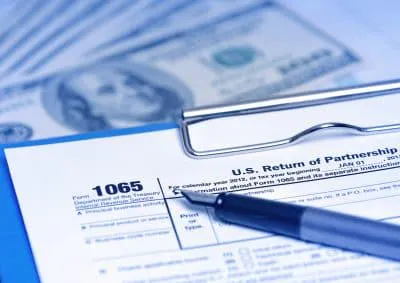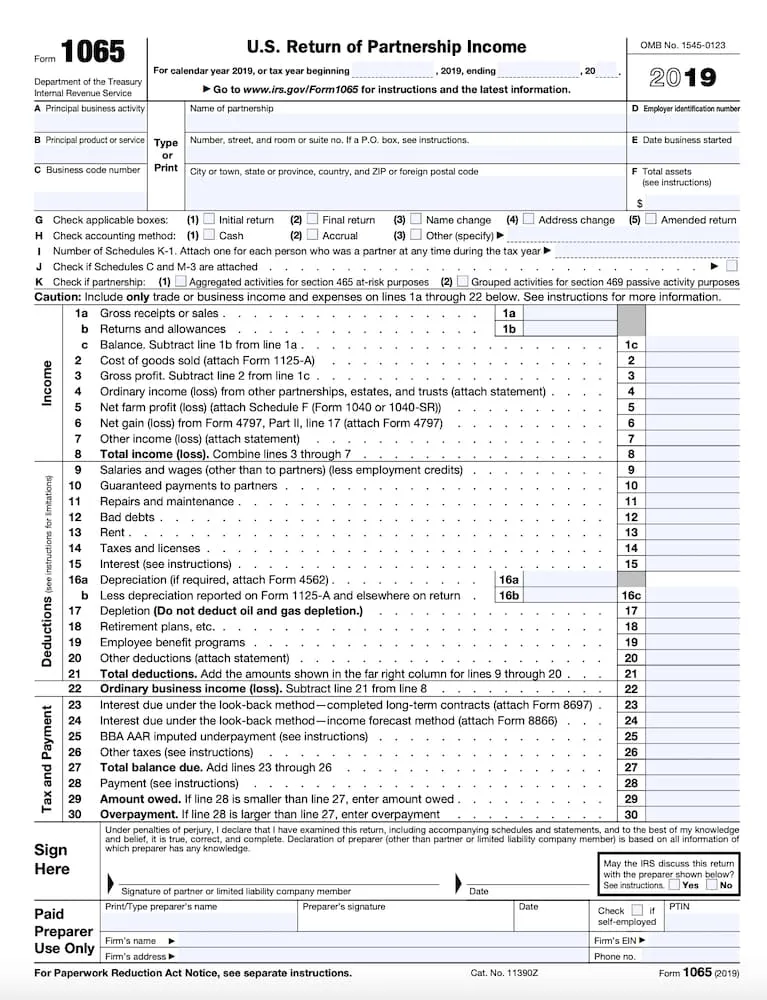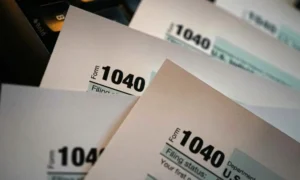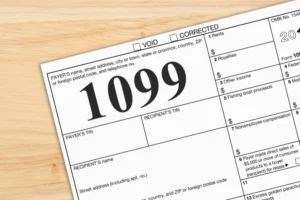What is IRS Form 1065?
The IRS Form 1065 is the U.S. Return of Partnership Income Form
This IRS form is used to provide information regarding your business that may fall into one of several partnership categories.
The form declares the profits, losses, deductions, and credits of a business partnership. It is important to note that Form 1065, although required, is not a form used to calculate any tax owed by your business. Rather this form is provided by your business for informational purposes to the IRS. Partnerships are a business entity classified as a flow-through or pass-through entity by the IRS.
This means that your business partnership does not pay taxes on its income, but rather the partners will pay taxes on their individual income that results from the partnership. Then, it is allocated to them according to the terms of the partnership which are oftentimes delineated in the partnership agreement.
What Types of Businesses Must File Form 1065?
Form 1065 must be filed by all business partnerships that conduct business and receive income anywhere in the U.S and its territories. The IRS defines a partnership as the relationship existing between two people, who come together to carry on a trade or business; these individuals will contribute to the partnership through money, skill, property, or labor and will share in the overall profits and losses of the business.
Your business’ partnership agreement will delineate what type of partnership your business is; in addition, partnerships are often registered as one of several partnership options in the state where they conduct their business.
5 Business Formations That Are Considered a Type of Partnership by the IRS:
- 1. General Partnership – A business structure formed by two or more individuals to conduct business where each individual will share in the profits, losses, and unlimited personal liability of the business.
- 2. Limited Partnership – This partnership structure allows one or more partners to limit their personal liability for the business to the amount of their investment in the business. In this business partnership arrangement, there must be at least one individual that maintains status as a general partner with unlimited personal liability for the business dealings.
- 3. Limited Liability Partnership – This business structure offers some limited protections to partners regarding their personal liability for the business; and excludes their personal liability for actions that are considered wrongful of other partners and for the debts and obligations of the business itself.
- 4. Limited Liability Company – The IRS considers a Limited Liability Company (LLC) a partnership if it has at least two members and has not chosen to be treated as a corporation by filing Form 8832 – Entity Classification Election.
- 5. Foreign Partnerships – These are business partnerships formed under the laws of another government, but who conduct business and earn income in the U.S. and its territories, and have not filed form 8832 to be treated as a corporation.
Why Is Form 1065 Necessary?
Although Form 1065 is solely an informational business return for IRS purposes, it is the tax return filed by your business partnership.
Form 1065 will not determine your business’ tax liability but will rather be used to determine each partner’s allocation of the partnerships income, losses, assets, and deductions which will then pass through to each partner and must be included in their personal income tax return through a Schedule K. The business partnership will not be responsible for paying business taxes of any kind.
Form 1065 partnership return will include basic information regarding the business partnership; such as its name and location, its EIN (Employer Identification Number, business start date as well as the type of activity the business engages in. Form 1065 will also be used to select the method of accounting for the business as well as identify each partner that is a member of the partnership and determining how many Schedule Ks will be created.
The Form 1065 – U.S. Return of Partnership Income will calculate all of your business’ tax-related financial data and allocate the partner’s shares according to the partnership agreement through a Schedule K that will list each partner’s allocation of items such as:
- Income or Losses
- Deductions
- Self-Employment Tax
- Credits
What Form Must Each Partner File With Their Taxes?
The business itself will file Form 1065 with the IRS. Then each partner will receive their copy of the Schedule K and file that form alongside their personal income tax return. Individual partners do not file Form 1065. The Schedule K form will be filed as part of each individual partner’s personal tax returns and each partner will pay taxes based on their personal income from the partnership in combination with any other income they have received throughout the year.
Exceptions to Filing Form 1065
There Are a Few Situations Where a Partnership May Be Exempt From Filing Form 1065:
- 1. – Any partnership that receives no income and/or made no expenditures throughout the entirety of the year is not required to file Form 1065 with the IRS.
- 2. – Only Foreign Partnerships that make more than $20k in the U.S. or earn more than 1% of their income in the U.S. are required to file a Form 1065; all other foreign partnerships are exempt.
- 3. – Single Member LLCs are not considered a partnership for IRS tax purposes and are not required to file Form 1065 although they are still required to include their business income on their personal return. LLCs must have at least 2 members in order to require to File Form 1065.
Looking for Fast Action and Proven Results?
Completing Form 1065 – U.S. Return of Partnership Income is a complex process that requires high attention to detail and accuracy. It is essential that this form is completed fully and correctly to allocate each individual partner’s share of the business partnership’s relevant items to be filed alongside their personal tax return.
Our team of experienced and professional tax attorneys at Silver Tax Group understands the unique issues faced by businesses such as yours and are available to offer our expertise and assistance to you and your business.
Are you Being Audited by the IRS?
Get the answers you deserve, speak with a Tax Attorney today!






